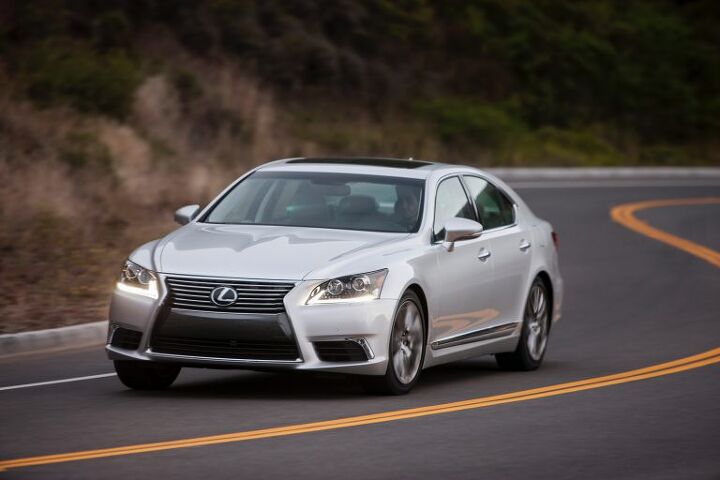#2018LexusLS
Lexus Got What It Hoped for With the New LS - At Least for Now
Every large, traditional Toyota and Lexus sedan seems to have hit that point in its lifespan where drastic surgery is needed to keep up with the younger crowd. Were these staid sedans people, they’d be milling about in the seating area of a local plastic surgeon’s office.
The first model to bend to Toyota’s desire for large cars that ooze dignified luxury but are also kind of green (and maybe kind of sporty?) was the 2018 Lexus LS flagship, appearing last year with a new platform and racy sheetmetal. The Avalon and ES will soon follow suit.
By revamping its LS, Lexus hoped to jam the brakes on a sales plunge that began after the recession and only got worse from there. Still, the automaker knew it couldn’t turn back the clock completely. There was a very specific sales goal mentioned during the launch, and it looks like the new LS delivered. Almost perfectly, in fact.
Toyota Expects Lexus LS Sedan Sales to Take Off Again, but Not Nearly to Historic Levels
Timing is tough.
Toyota’s Lexus luxury marque launched the fourth-generation Lexus LS for the 2007 model year, just prior to an economic collapse that was followed up by an anti-car/pro-SUV shift. Lexus, which averaged more than 25,000 annual U.S. sales of its LS flagship sedan during its third generation and then topped 35,000 sales in 2007, suddenly found itself struggling to top the 10K marker.
As the fourth-gen LS’s tenure came to an end, Lexus watched as demand for the LS quickly collapsed. From fewer than 11,000 sales in 2013 and fewer than 9,000 in 2014 to barely more than 7,000 in 2015 and only 5,514 in 2016, the once hugely successful Lexus LS — a former leader of America’s large luxury sedan class and the car that was responsible for the genesis of Lexus — became an afterthought.
The fifth-generation Lexus LS is set to go on sale this winter, and Lexus expects to see a huge increase in demand for the new car in 2018. Lexus does not, however, expect the LS to generate anything like the kind of interest the big sedan did prior to the proverbial global financial crisis.
The Gas-powered 2018 Lexus LS Won't Be Lonely for Long
The next-generation Lexus LS flagship’s top-to-bottom revamp took some fans by surprise when it was revealed ahead of the Detroit auto show. Not only did it do away with a formal roofline, a V8 engine — which has powered the model since its inception — was no where to be found, replaced by a twin-turbocharged 3.5-liter V6.
It appeared as if convention wasn’t the only thing Lexus planned to ditch, as a hybrid model was neither announced, nor teased. As it turns out, Lexus did tease an upcoming hybrid variant — we just needed to look closer.
NAIAS 2017: Look Over Here, Please, We Beg You! Lexus Hopes 2018 LS Returns Flagship to Relevance
It wasn’t long ago that Lexus could reliably sell 20,000-plus LS sedans in the U.S. each year. Certainly, the model’s pre-recession sales performance fell under the heading of “reliable,” with over 35,000 sold in 2007.
Ever since great economic upheaval sent American buyers fleeing in increasing numbers into the arms of crossovers and SUV, the Lexus sedan that created tsunami-like ripples through the luxury car field in 1990 has seen its customer base erode. Just 5,514 U.S. buyers saw fit to take an LS home in 2016.
Could a redesign bordering on the radical be the medicine the LS so desperately needs?
It's About Time - Lexus Will Finally Show A New LS Flagship AT NAIAS In 2017
The current automotive climate is not a favourable one for full-size sedans, luxury or otherwise.
Many automakers have persevered, reinvesting in their flagship sedans despite decreased demand. BMW, for instance, suffered a 29-percent loss in U.S. 7 Series demand over the last decade, yet the company introduced two new generations of 7 Series during that period.
Lexus, however, has allowed the LS to wallow in a pool of its own misery. The car that started it all for Lexus was once a conservative, value priced, marketplace leader in the full-size sector; a car that could beat the overpriced Germans at their own game. Now, the decade-old fourth-generation Lexus LS has all but disappeared from the public consciousness. Sales have fallen 73 percent since 2006.
Toyota has finally determined that it’s time for a new Lexus LS. In fact, it’s been time for a new Lexus LS for quite a while.
Next-generation Lexus LS Could Break With Tradition, Offer a V6
The flagship LS built the Lexus brand’s reputation by offering quality on par with the Germans and a V8 engine that was smaller and more advanced than those fielded by the Americans.
The model continued on a relatively fixed course for the next 26 years, slowly increasing the displacement of its V8 and giving a nod to environmental pressure with a hybrid variant. Even in the LS 600h, the battery is still strapped to a 5.0-liter V8.
However, a trademark application uncovered by AutoGuide suggests that the LS’s drivetrain tradition is due for a shakeup.





















Recent Comments